

That Last Post:
From all appearances, I posted a few lines about stuff I did in 2024, promised more, and nipped off. I actually do have this post mostly completed on my hard drive, but in the interim, I landed on a new professional job that involves a lot of watching franchise material. With the demands of work and the Translation Project (below), something had to give, and the something was that post. I held off on blogging further primarily due to lack of time but also because I wanted to see that post finished before moving on, but, well, this existence of this post proves that that ain't gonna happen. It will be finished, but not before more new material appears. Sorry.
The Translation Project:
The Translation Project is continuing apace. Not a glamorous update, but there are certain phases of projects where it's just a lot of heads-down work, and the best you can say is "yep, still ongoing." I should be able to make the "end of April" date I projected for my end of the work - that is, of course, providing that no other work or life matters intervene. If that changes, I'll post notification here. (I will say that for purely personal reasons, it would be hard for me to stay on the project past June, and there is a practical limit to the amount of time I can take up from folks who are graciously volunteering their sweat & tears here, so there's a built-in hard stop to faffing about on my end.)
I'm knocking out the larger files first, dedicated to love interest lines; there are numerous smaller files I have basically done but want to check something in the actual game before I send them on. In any event: The part that was the big sticking point for me alone, having a format for the script that's usable for a patch, has graciously been remedied by other parties, and I'm dedicated to seeing a properly-translated version of this game happen, no matter what it takes.
Other folks' writing projects:
On a note: Kimimi wrote an appreciation a few days ago of a certain game. It's a strong overview. It's an excellent fond summary of the Angelique experience: "sitting in a room so pink Barbie would think it was a bit much while a grumpy Guardian tells me how much he dislikes lobster." No, seriously: as essential as that is, Kimimi brings home many of the core characteristics of the franchise: how safe the game's romances and universe are, or its smart use of the smallest actions or bits of dialogue to illustrate character (such as Clavis during the tutorial jumping, so far as he jumps, at the opportunity to teach you how to cut out of conversations quickly), or the importance of soft power on the road to the throne (admittedly, I have a more mercenary view than Kimimi on this).
My site:
Effectively on hiatus until I finish The Translation Project. I'd like to finish up the Beep! magazine Lunar interviews before the Steam rerelease at the end of the month, but that might not be in the cards. It seems as if most people have concluded I'm making up the interviews and Kei Shigema's Lunar 0 ideas, but I can say from decades of experience that that's the Lunar fandom for you (the part of it off Tumblr, anyhow; the fans on Tumblr are uncharacteristically friendly).
Dead by Daylight:
Dead by Daylight is taking a break from content for a big quality-of-life update, and so am I. I was aware of how much of my gaming time it was taking up - mostly not wasted time; I genuinely enjoy the game, and it's made with great love - but it feels so good to make actual progress in other titles I want to play. There was a Resident Evil-themed 2v8 mode I wanted to try, but I missed the deadline, and I think I'm better staying on the wagon, in the end. In retrospect, Brad's years-long obsession with a live service game to the detriment of his personal and professional well-being, considered an anomaly in the day, is more of the more prophetic bits from Giant Bomb.
Tumblr:
I am back on Tumblr. Reservations aside, with the world going to hell (or the United States going to hell and trying to drag the world with it), it's no time to disconnect, I suppose. I don't post there often, but it is my sole social media presence. There are folks there I'm very happy to see again, but there are times when I wonder just what it is I'm doing. I still think the AI mining is, well, a minefield, but it's the only place to social media platform to post and view art that has a opt-out option for AI.
Movies:
I'm OK with the cinematic experience dying now.
Note: I meant to have this post completely ready by today, but I've had a few job and other real-life matters to which to attend over the close of December, and I have a few celebrations to enjoy at the end of the year. I'd rather take the time to commemorate the stuff that meant a lot to me this year properly instead of rushing it to meet a 2024 deadline. This post, then, will have to be a work in progress for several days. When it's complete, I'll post a notification here.
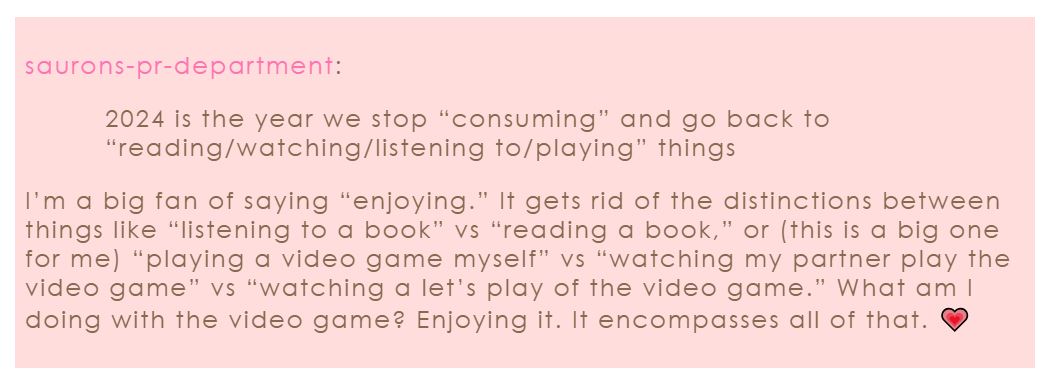
At the start of the year, bonbonbunny above pointed out that enjoying games nowadays encompasses more than playing them firsthand - it also includes enjoying when people you like are playing them, or enjoying content produced about them. This really struck home with me, reading it as I watched Jeff Gerstmann play a bit of NES Dragon Warrior, and though I did manage to play a good amount of games this year, I indeed found that much of my enjoyment of games came from sources outside of playing them directly.
Translating (Professionally):
My professional translation career experienced a number of landmarks in 2024. First, there was the release of Sand Land, the open-world, vehicle-heavy RPG based on the Akira Toriyama manga. It was an incredible honor to work with Toriyama's characters—I love you, Rao—and I was super happy to be part of this project. It was a joy to watch it from pre-release work to the announcement to it coming to market - the first time I've ever been part of a single-player title release this big.
Second, I've been working for much of the year on another title based on a manga from one of the field's most venerable and globally-popular artists. This title hasn't been announced, so I can't say more - other than the game genre is a change of pace for me, but offering plenty of character in which to sink my figurative teeth. It's an honor to work on this property, and it's been a pleasure to spend time with the game's cast, which has, after these many months, come to feel like a second home.
Third, I was fortunate enough to be appointed (it's a supervisory role! I'm using "appointed"!) to an editing position on an RPG in one of the genre's foremost franchises. One of those franchises on which you dream about working when you first join the craft. One of the franchises. The title's still under wraps—shh!—but I'll be sure to let everyone know in an extremely tiresome manner of my involvement once the cat's out of the bag.
These jobs, though, delivered joy not only via the prestige and the work itself, in the ability to be part of bringing these stories to audiences, but in the substance of the stories. There are a couple moments I encountered in translating text that were some of the most potent of the year for me - even though I experienced them solely in text and stage directions - that I was hoping to discuss here but can't, because the relevant games haven't been released or, in one case, even announced yet. I'll come back to this post in however many months it takes for that to happen to share my thoughts properly.
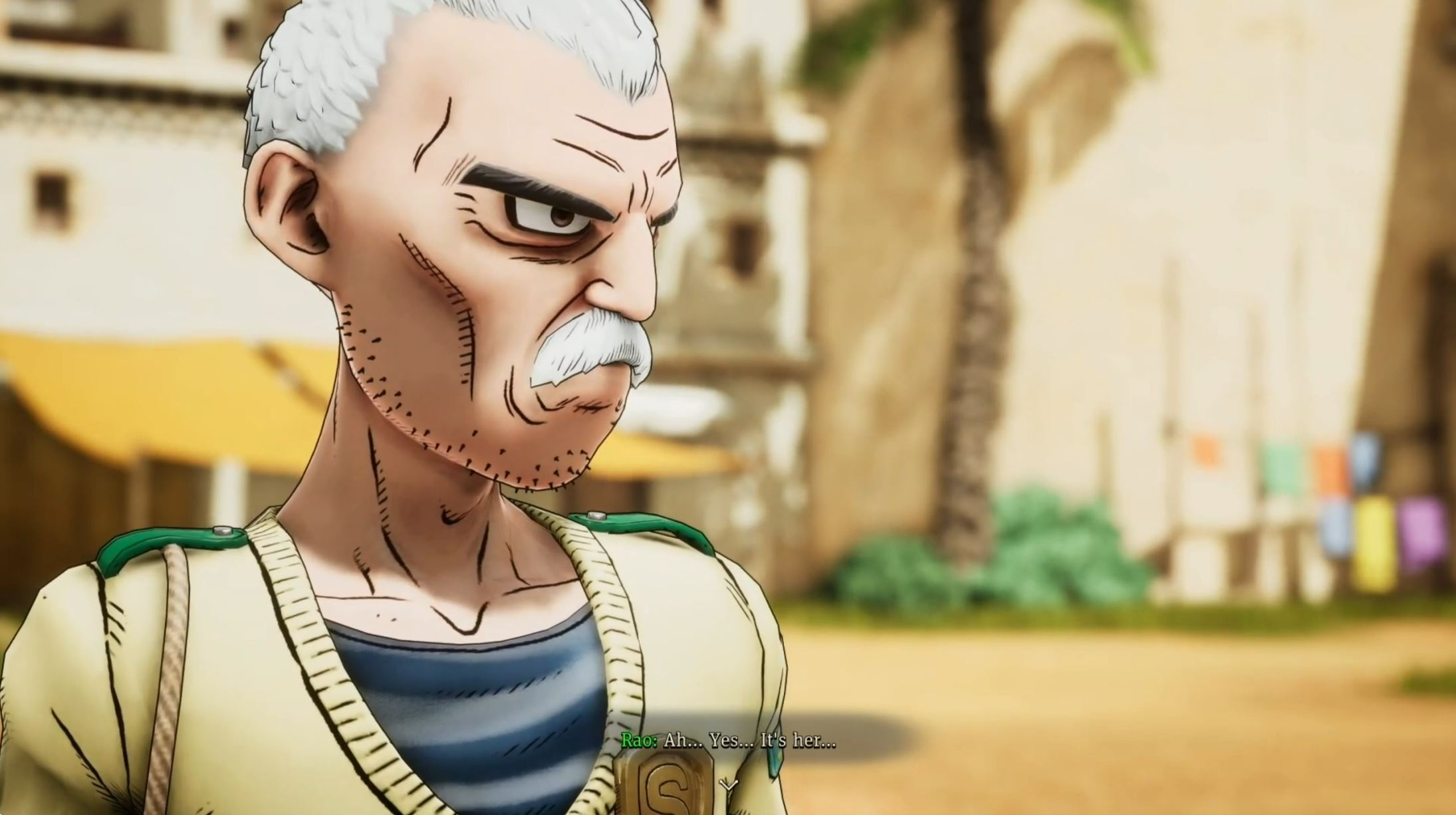
One moment, though, I can discuss: the closing questline of Sand Land, which involves the chance discovery of a long-lost song by the late wife of one of the main characters, with the party then becoming the vehicle of a grassroots idea from a few fans to share the song with the world's newly-reunited populace. I got to translate that questline, and I felt it was a beautiful coda to the game. The group finds some part of civilization, of happier times, surviving in a pocket of the world where it's been loved in a smaller scope and has been bringing joy to others, that is rediscovered to bring a message of joy and hope to a larger, reborn world, bringing unity to a society that's long lacked it - and a small reminder of love to a man who's learned to go without such things but deserves one nonetheless. This wasn't labeled as the final questline when it was handed to me, but its role in wrapping the game up in a beautiful bow was shiningly obvious regardless. A glorious way to commemorate the survival and reflourishing of this world.
(I will be the stereotypical persnickety translator here for a moment, though. When the party finally hears a proper recording of the song and has an emotional response, one of the group asks after their comrade Rao, the late singer's husband, wondering if he isn't upset to perhaps have a wound reopened. (His wife died as part of a tragic mistake he made decades ago while working in the service of a corrupt military endeavor.) His laconic response was, in my translation, "My tears all dried long ago." I see from watching a video of the quest that this was edited to "My tears all dried up long ago," which is literally a two-letter addition, I know, but to me connotes a different emotional reaction, one less involved and more dismissive. I feel the original communicates that Rao's had his tears, but that he's come to a point of...not acceptance, quite, as the situation is not one that can be accepted, but of acknowledgement and coexistence with the past and the way things are, good and bad, that seems at the core of Rao's character. The edit (my tears have dried up, it's impossible for me to have an emotional response to this anymore) seems to dismiss the possibility of tears at all, to dismiss what's happened, to be about stuffing emotions down and denying them in a stunted way. Editing has to happen, but I feel this was a loss nonetheless.)
Translating (Hobby):
There have been ups and downs with The Project That Has Consumed Me, but I'm grateful that I have the help of folks who know what needs to be done on the technical side and am finally within what might be generously called the homestretch - even if, in the process, I discovered that, due to version differences and formatting considerations, I basically had to translate the entire goldang game again. Again, thank you for your patience.
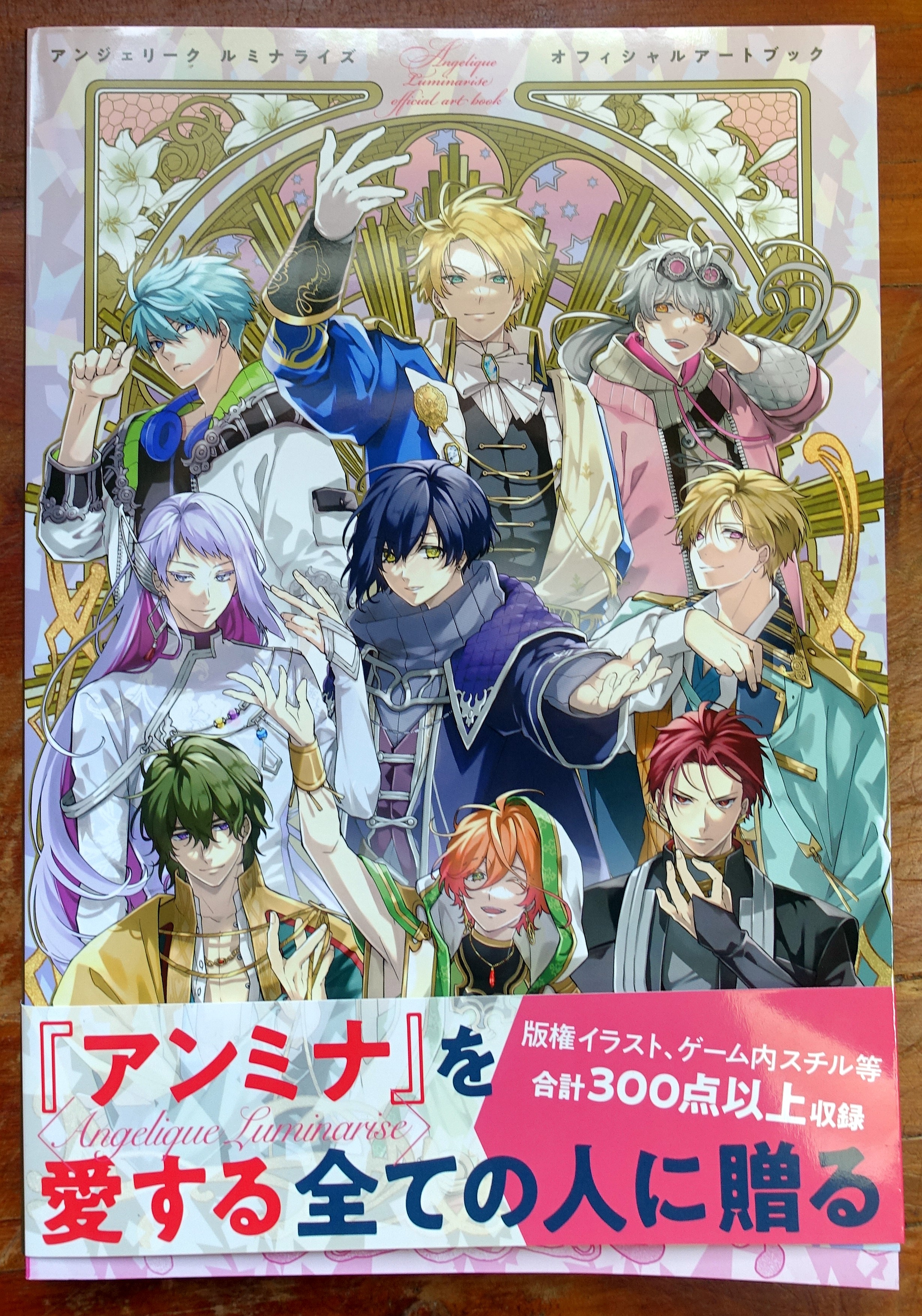
This seems like whistling past the graveyard given the events of the week and now that Tony Todd has taken from the world - I prefer to think that he was raptured - but I got the Angelique Luminarise artbook. It's well-produced, but it can be dispensed with fairly quickly: Both the best and worst you can say about it is that it's an exhaustive compendium of all the digital art available from the game by lead artist Sayo Ichi (plus Munashichi, a talented landscape illustrator who designed the Guardians' offices).
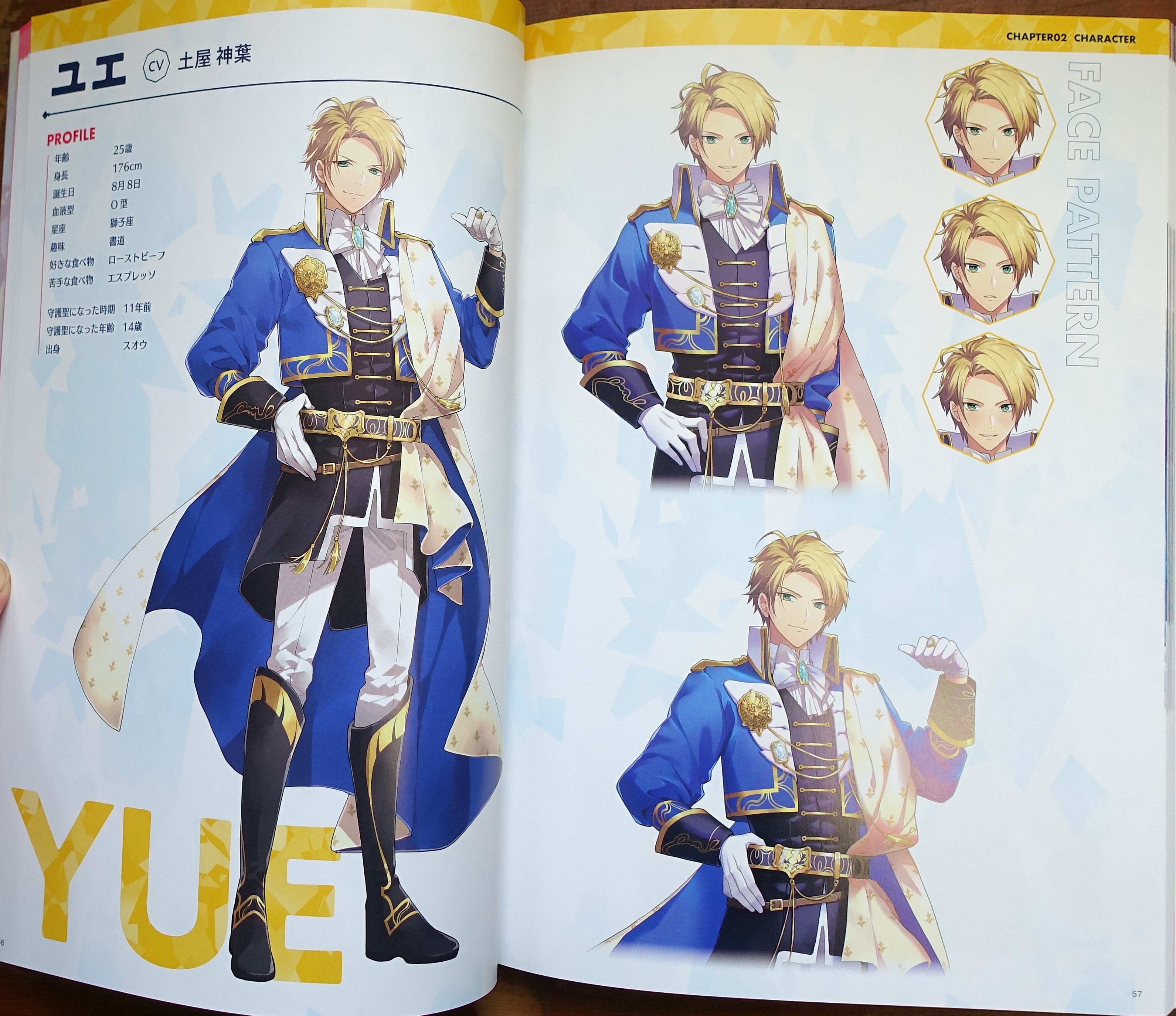
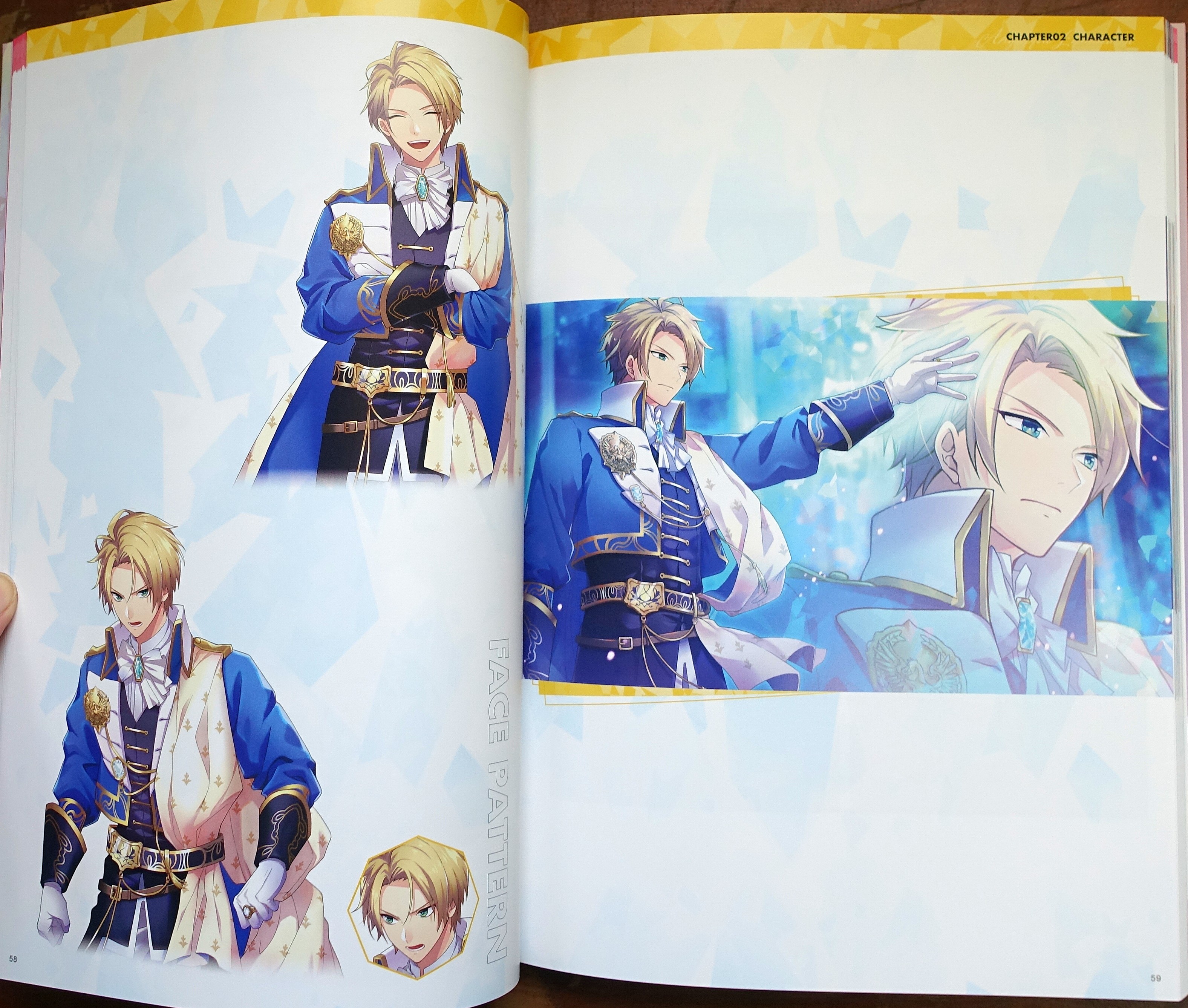
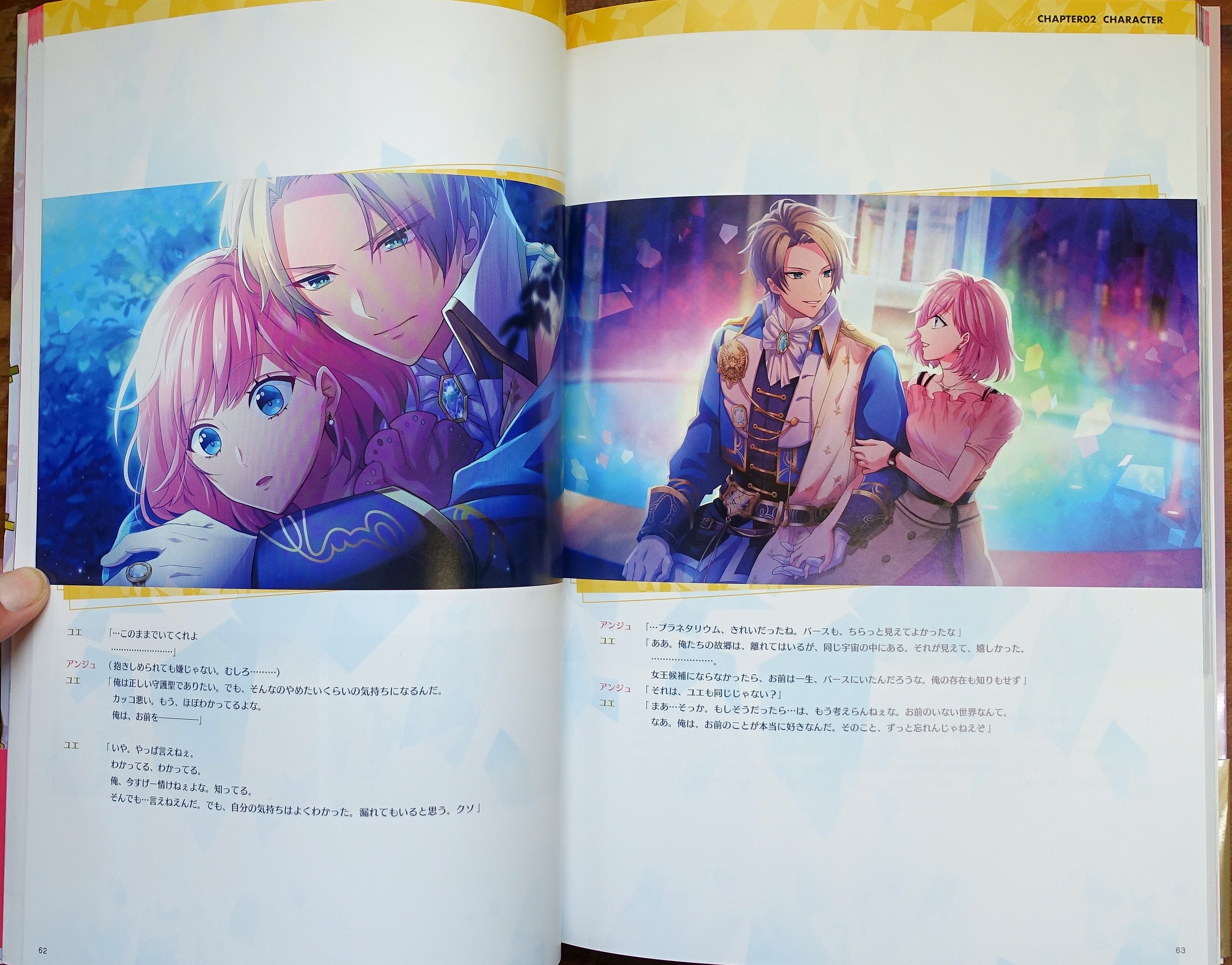
Sorry for the binding eating up so much of the images on one side, by the way; it's a new book, and most of the images of interest are at the front or back, where the issue is most exacerbated.)
This includes an extensive collection of in-game background stills and character art of the love interests and others in the cast, of course, but it also features promo art for B's Log articles and LINE-like social media icons and the Famitsu black & white promo comics that served both to introduce characters and, via a couple old-school OL Angelique fans, the general concept of the game.

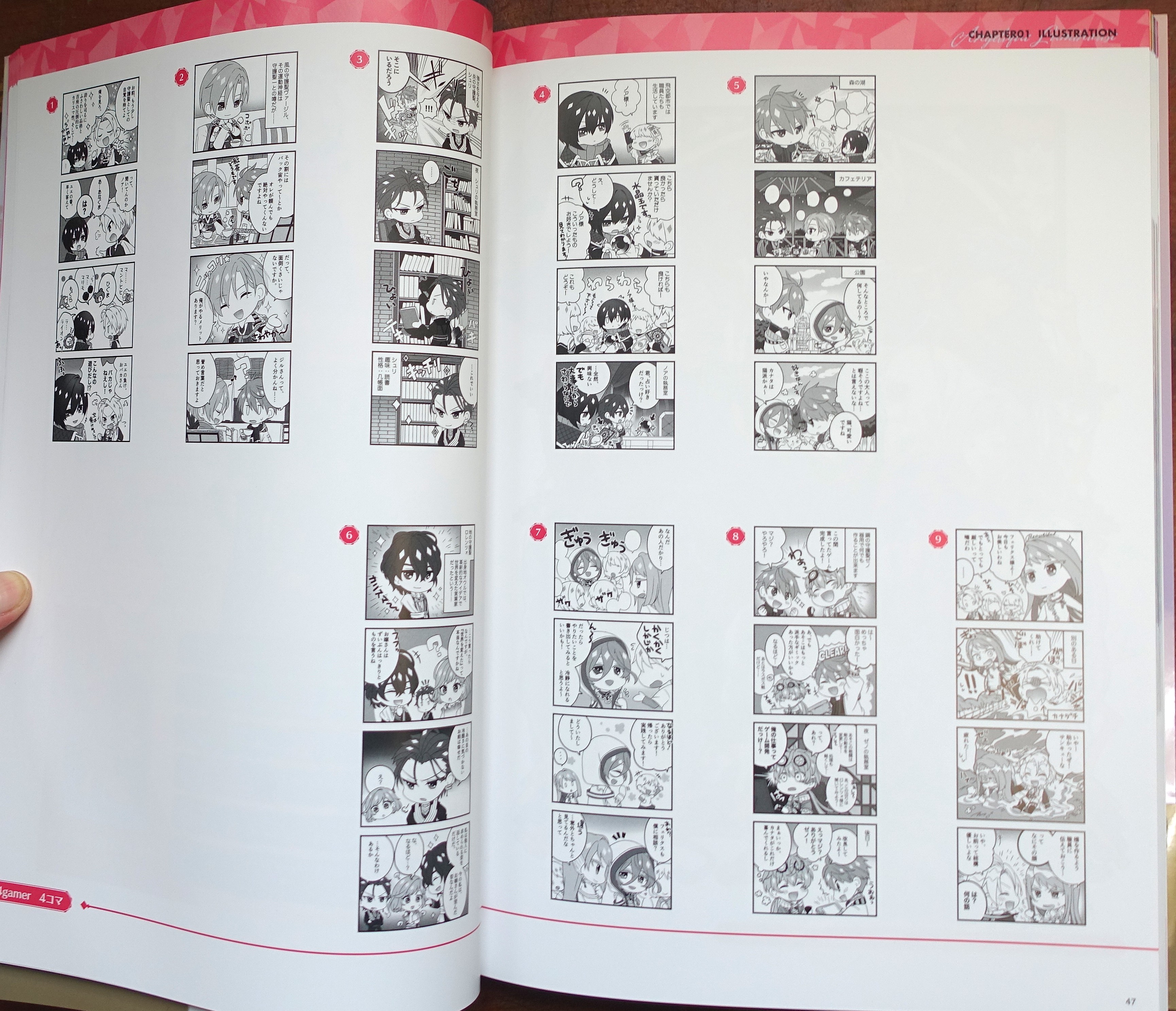
There's also a good amount of art for merchandise: art of the cast (including Ange; not Reina, though) in black leather from merch from one of the stage shows; the standee art of the Holy Bird Guardians (Julious & co.) interacting with the Luminarise Guardians illustrating the 1st/2nd/3rd Step CDs; etc.
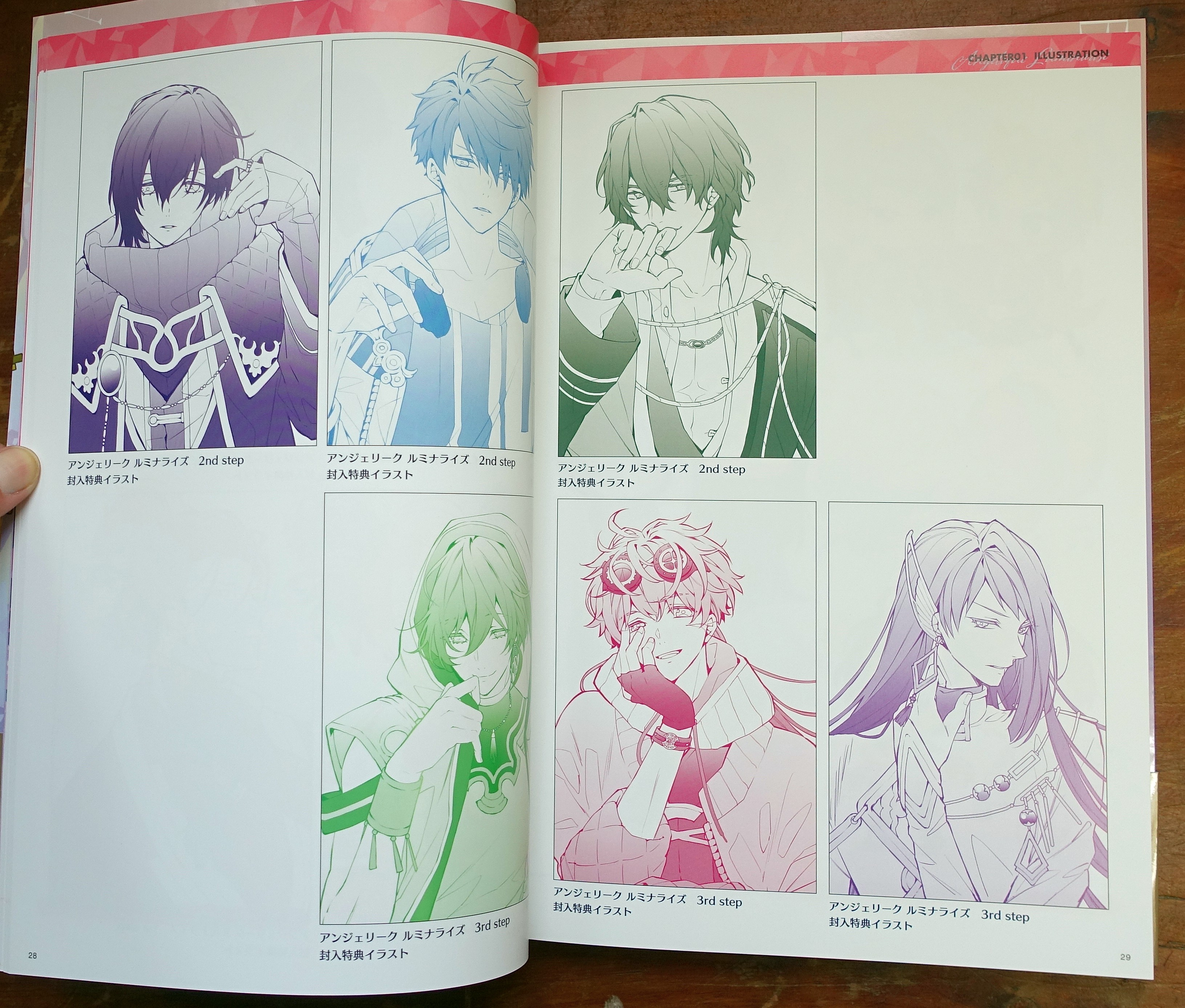
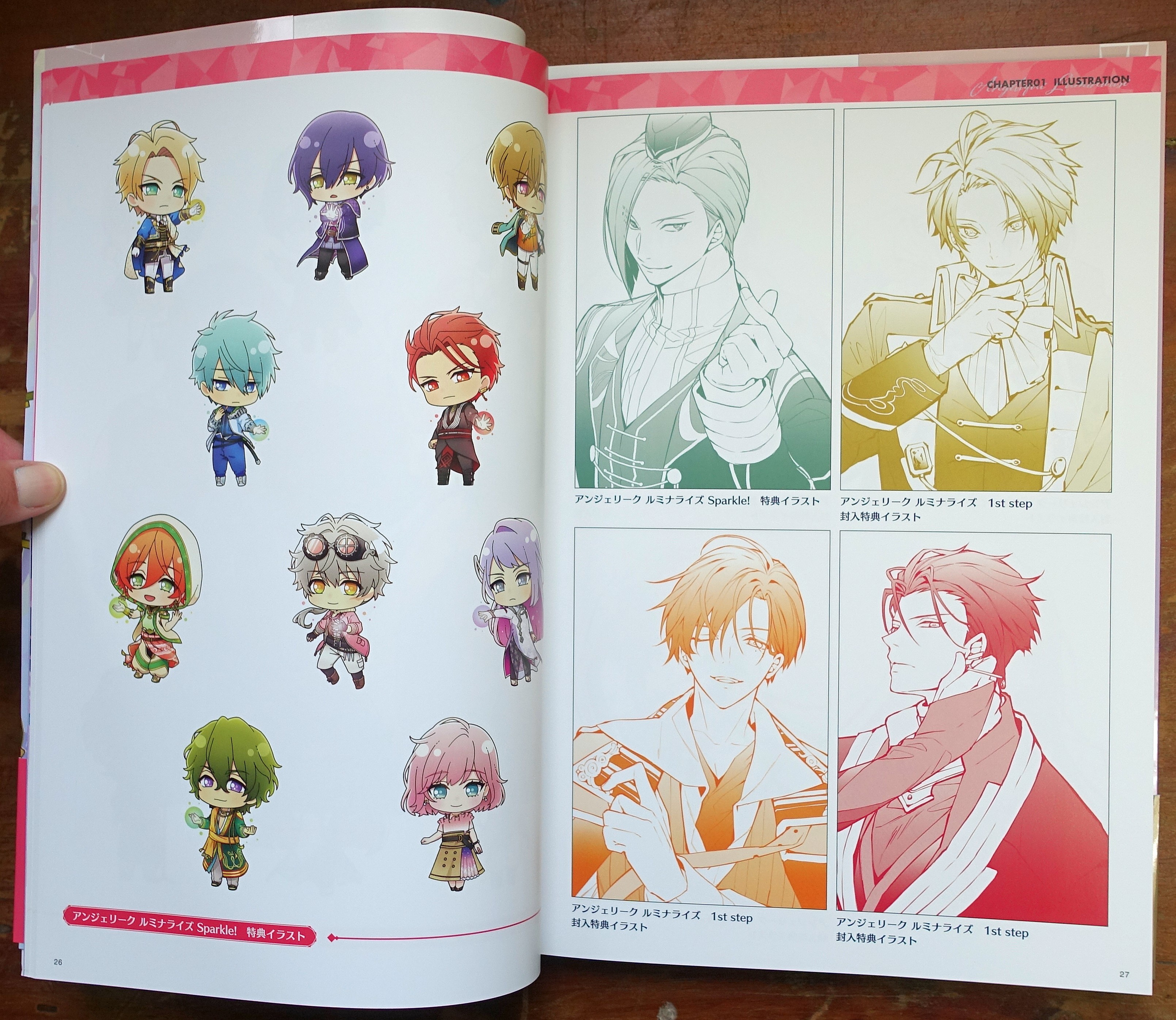

This isn't completely exhaustive—say, art for merch for some eatery promotion of the characters dressed as waiters and maids done in a ink/watercolor French cafe style is absent, maybe due to the use of a different artist than Sayo Ichi. Most of the merch art is present, though—and this will count as digital art for most, as you're likely familiar with it primarily from photos on Suruga-ya or Yahoo Auctions.
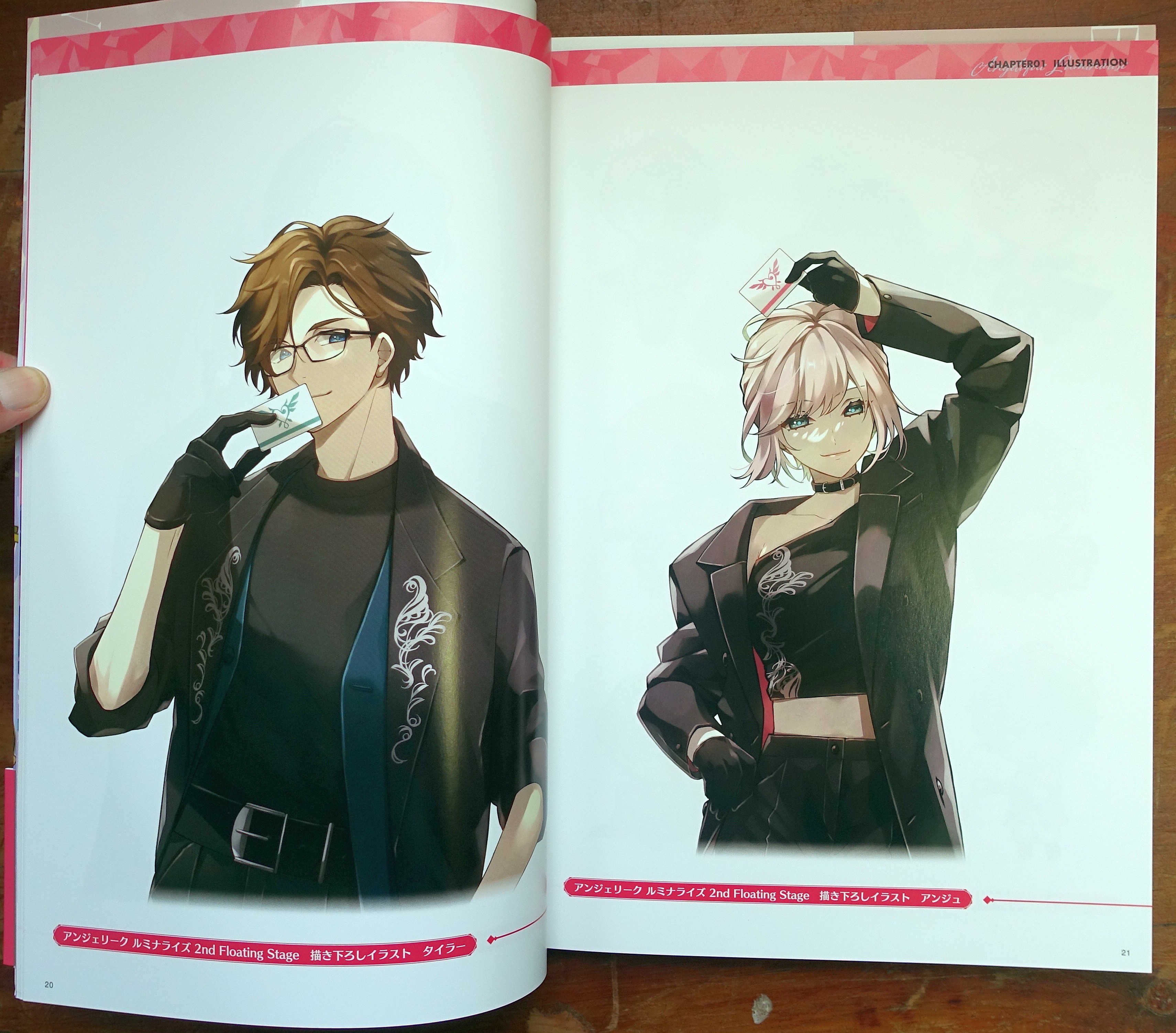
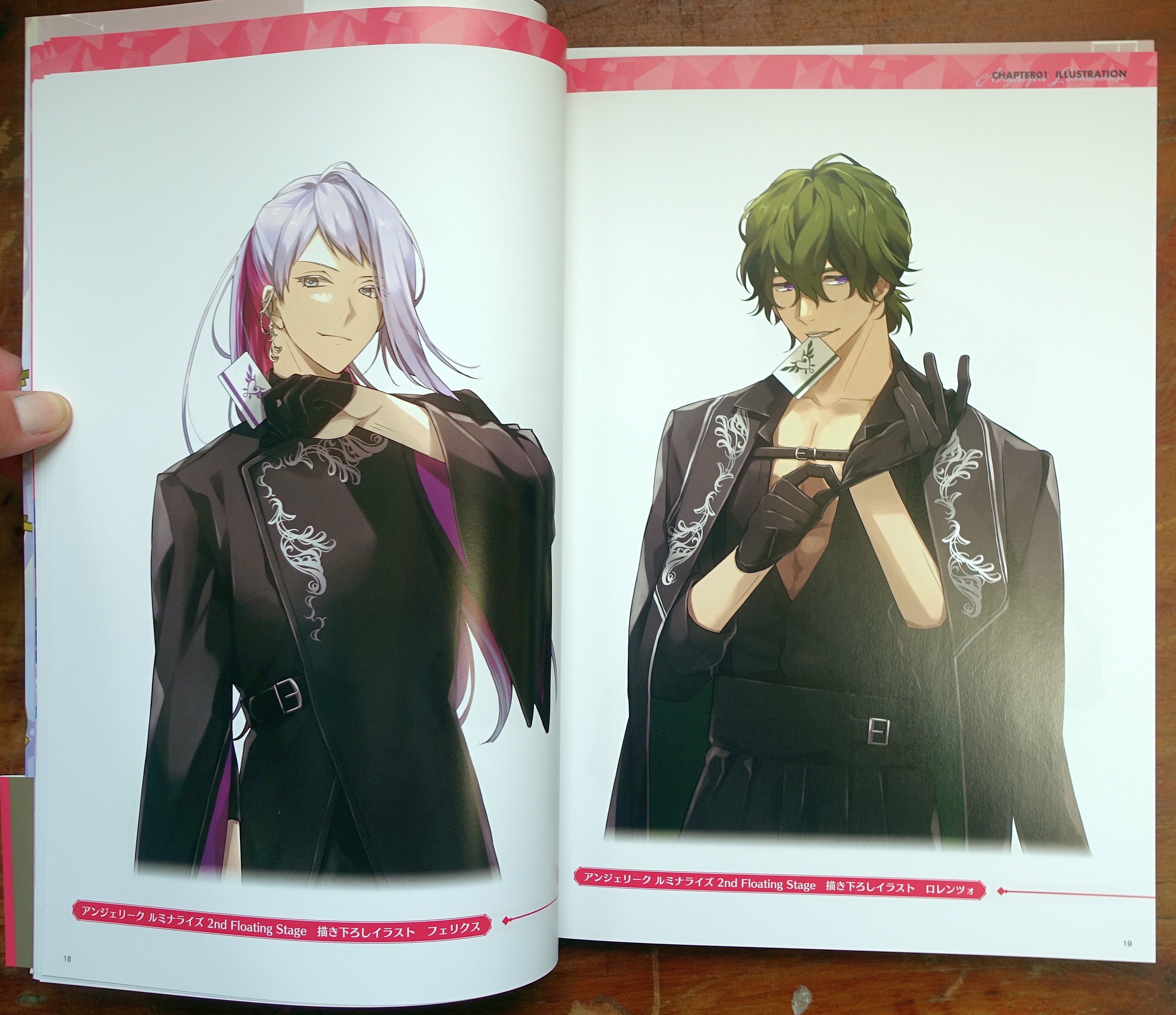
The flip side is that, save for a few headshot sketches in back, you're not getting anything that hasn't already been released. You can still view most if not all of this online where it was originally posted, if you like. The art's also commentary-free - nothing on the pieces save for its original place of publication. Disappointingly, there's no interview with Sayo Ichi (or Munashichi), either. (Kairi Yura used to do interviews for days.) It also, save for three-and-a-half pages in back of a few headshot sketches for each Guardian, doesn't have any design material.
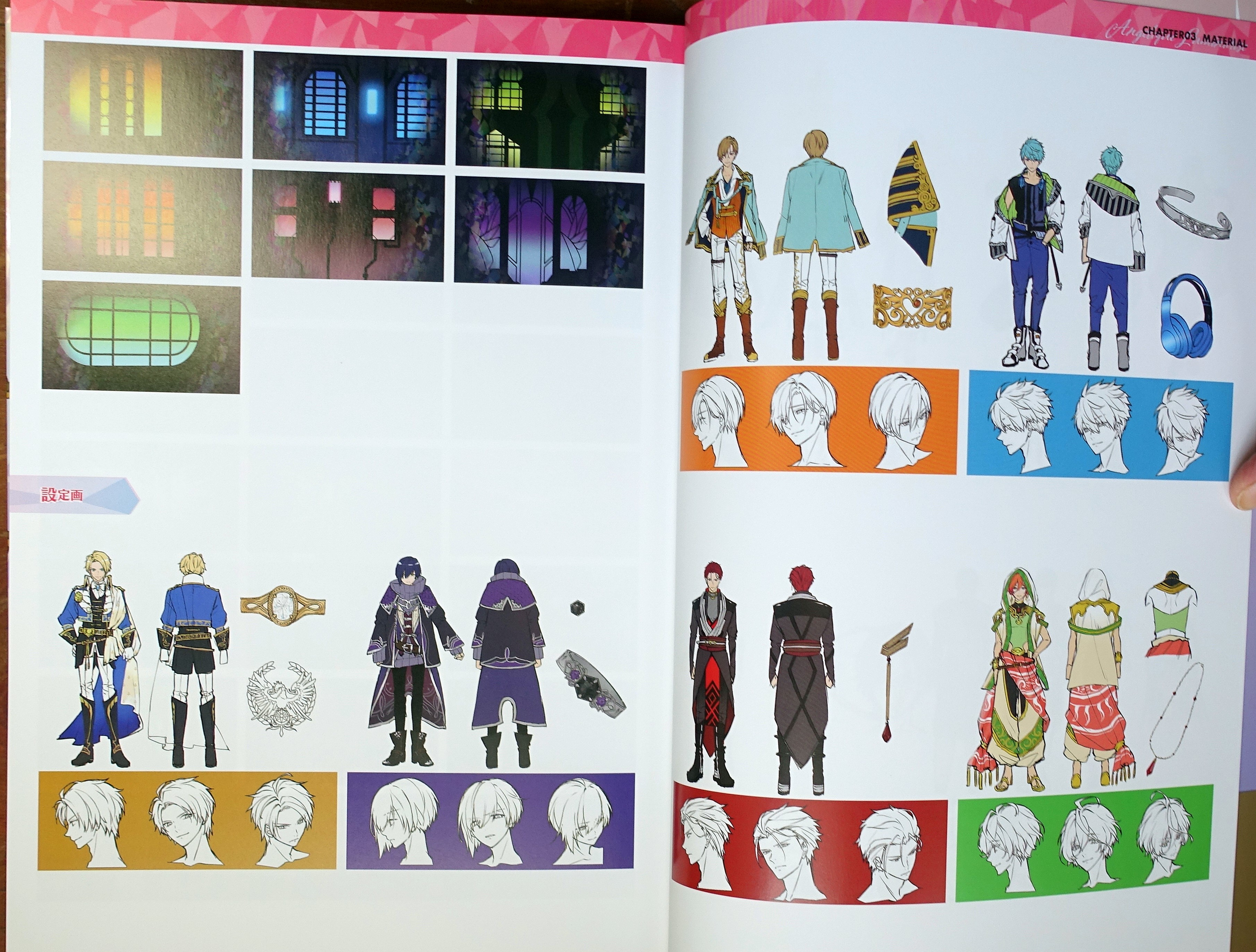
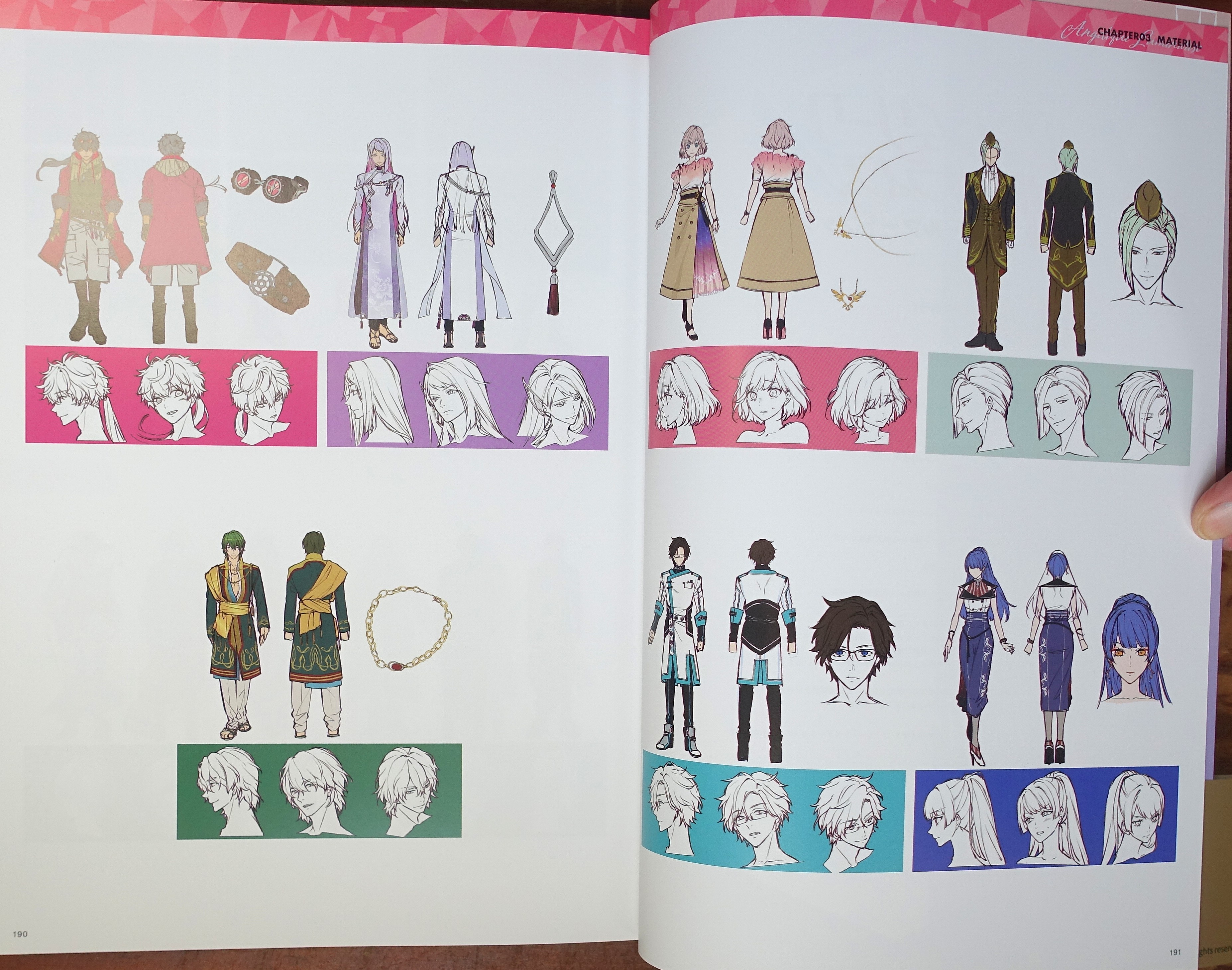
Angelique has never, ever been big on this; even the settei books for the Neo Ange and Koi Suru Tenshi anime have only finished, production bible-level sketch work. I don't know if it's a mandate from on high or what: the love interests must be presented fully-formed, like Athena from Zeus's head, with none of the nitty-gritty on how the design concepts came together revealed, at least visually. The odd upshot of this is that, even at fewer than 50 pages, the Maren artbook that came with the deluxe edition (viewable on this page, showing actual production sketches, rejected costumes, etc.) is probably the most extensive behind-the-scenes visual resource we've had.
Verdict: Nicely presented but not essential. Nevertheless, it's convenient to have this all collected and on paper.
I was going to conclude this with a photo of Tony Todd at the aquarium he used for his Twitter avatar, but the specific one I had in mind seems to have been wiped from the internet. Sic transit gloria mundi.
- 3 female Busters with inflatable Stay-Puft, later joined by Slimer
- Poison Ivy, Wonder Woman, Riddler, Catwoman
- fawn or maybe fox
- beautiful female grim reaper looking like Monica Bellucci from the Beetlejuice movie - only like 10 years old or so, but very solemn
- reaper with neon green mask & green glow-in-the-dark scythe
- a very thoughtful young female Legolas, albeit with lacking bow discipline, pointing at very in crowd. Then again, maybe some of them deserved it. She complimented my outfit very politely. She was the sister of the grim reaper, about the same age
- a crowd of middle-school boys w/ unremarkable costumes but who seemed to know and enthusiastically welcome everyone in town. "BILLY!" "Steve? STEVE!!" "RALPH! We love you! We know you from your signs!" (Ralph, I later discovered, was running for local public office and put no information on his signs other than a couple pictures of Corgis.) "It's Sonic and Knuckles." "Sonic & Knuckles!" "No, Sonic and--" "Sonic and TAILS!!" (It was indeed Sonic & Tails)
- Foxy from Five Nights at Freddie's, with Dad & Mom in Freddy & Bonnie masks (Dad was also wearing a button-down short sleeve with an allover FNaF print; mom just had matching sweatshirt)
- a very young garbage collector riding on a pulled wagon turned into waste disposal truck
- a speaker. Like, the audio equipment. I initially was confused and thought this was a turntable, which is in itself confusing. Seriously, though: buy your kid a proper costume
- family riding inflatable T-rexes in different colors, except for one riding an inflatable green brontosaurus
- Ariel bent backwards with bass drum larger than her, and taller then her when hoisted up
- a nice kid who looked like a Space Channel 5 character? She had her hair in neon red odangos and matching neon red heart face makeup, plus vaguely futuristic attire straight from that game
- a king, and while it was a very simple king - just a traditional gold crown and cape - the guy's beard and physique made him perfectly suited an Old King Cole type of king. Dude knew his lane
- a guy with this sleeveless, frayed canvas cape-robe garment over a red-and-blue worn-out band-design T-shirt with roses on it and a wooden staff. It was a supremely odd look for a wizard but worked on some level
- a woodland fairy in moss colors with pointed wings; looked really together and good
- a Stormtrooper, suitably short, with a white lightsaber, chased after by a Mom in an R2D2 dress; lots of lore mixing there
- Rey sitting on a rock overlooking the shore, looking very Star Wars pondering-the-call-to-adventure dual-sunset style (her hair and costume were excellent, BTW)
- an elderly couple in matching Deadpool outfits
- a giant red-and-white-striped box of popcorn, with the popcorn made using spray insulation
- Sam from Trick 'r Treat (this was like an 8-year-old)
- 7-year-old Mike Myers, knife dutifully in Tombstone pose
- Finn in Padawan robes - correcting canon, I see
- Iron Dad + little Spider-Man
- this was not a costume but a house decoration: giant silhouettes of a three-piece trio of aliens playing classical music. Are aliens considered Halloween-appropriate now? Another house in a nearby town had an inflatable cow mid-abduction on its lawn
- then again, this house also had tombstones in front that listed names of poisonous herbs ("Deadly Night Shade," "Hen Bane"), so who knows what was going on there
- one house had a skeleton chef serving cafe patrons with a "Bone Appetit" sign, though, so that was good
- also, one house had ivy growing up the pillars of its front porch, thickest around the center pillar, and by attaching giant cutout eyes to the central pillar and hands on the two pillars flanking, they made it look like a moss monster
- the best decorations, though, were these giant inflatable eldritch purple tentacles attached to one house's upper-story windows to make it look like they were coming out of them
- back to costumes: two little kids (twins?) in oversized safety vests, traffic cone mom, and...I guess safety inspector dad? (orange hornrims & suspenders with a button-down shirt plus slacks...but also, curiously, an orange knit cap)
- retro astronaut, complete with shiny silver suit & jetpack
- very tired & over it little lion, slumped to side in stroller, motionless & scowling straight ahead
- classic Mickey Mouse mom in leotard & shorts + daughter in frilly Minnie dress w/ accessories
- husband & wife garden gnomes
- female police officer in classic-style navy uniform w/ peaked cap & skirt (with a buttercup frill on the hem)
- another female cop in dress
- Gandalf pushing firefighter in stroller
- the puzzle pieces, again
- actually, this time, the puzzle pieces were accompanied by an undead bride who had repurposed an actual wedding dress, its train dragging through the street & collecting dead leaves. Which I suppose added to the effect, but it still seems a waste of what seemed to be a quite pretty wedding dress
- a sheet-over-the-head ghost except the sheet was black and had no eyeholes or any evident means of seeing
- very proper Hermione; her uniform was crisp & put-together, but she also had the carriage
- bored Jason in sweatshirt texting on phone
- a tweenager in a metallic robe and face paint, best described as an Insane Clown Posse laser wizard
- a friendly BotW Link w/ blue tunic and the good shield they sell
- fairy in multicolored pastel layered taffeta dress dotted w/ fairy lights, very pretty
- another fairy in color-coordinated dusty rose
- dad chef w/ ambulatory spaghetti made of very thick yarn
- mom & son private eyes in matching trenchcoats, hats, & glasses
- Barbie hot pink cowgirl + pastel pink cowgirl in dress
- potted plant: plastic pot cut in four pieces arranged around the hips, brown sweatshirt, fake leaves "growing" out of head
- inflatable Among Us impostor, knife also in Tombstone mode
- a man with no costume except a tall piece of yellow paper wrapped around his head like a pope crown, except it wasn't shaped like a pope crown, it was just a rectangular piece of yellow paper
- dad Woody, mom Mr. Potato Head, daughter Mrs. Potato Head, baby seahorse w/ blue metallic curled ribbon on pigtails
- Pablo Picasso or Leonardo Da Vinci (long white beard w/ bald head & beret)
- vampire panda
- Saruman, Gandalf, Legolas, Galadriel, woman w/ leaves stuck all over her, man w/ fake leaves stuck on head. Ents?
- a girl who looked very much like Veruca Salt - she had a beige dress, which is the wrong color, but very '70s hair and styling. Dead ringer on the face
- little kid tornado, made of wrapped, shaded white tulle + lights - this was cool
- woman in light bulb crown carrying stuffed brontosaurus (?)
- family of sheep
- homemade felt mushroom hat - very well done (and it lit up when I saw it later), but only one element of a costume
- Scarecrow + Tin Man + Cowardly Lion + Glinda + Wicked Witch; no Dorothy in sight
- Dad in horse mask & brown sweatshirt who insisted on "galloping" everywhere
- Ash Ketchum + fox; unclear if these costumes were supposed to be connected in a confused way
- little kid dressed as family dog in bandana, w/ family dog in bandana walking alongside
- guy in giant box of Total, except it wasn't mimicking the packaging of actual Total; it was just a big brown cardboard box with "Total" and a couple fake nutrition facts written on it in black Sharpie
- matching green & purple celestial witches
- pickle
- papier-mache monster truck + Lisa Frank jaguar
- hospital patient walking w/ IV and giant paper image of a can of Dr. Pepper pasted to his chest (???)
- a whole lot of deer this year, oddly
- a piece of bacon sandwiched by very small hamburger
- red, white, & blue lucha mask + nWo shirt (???)
- a fight between a giant inflatable red metallic balloon animal and a guy "riding" a giant inflatable rubber duck
- that girl from Demon Slayer, but without the bit in her mouth; I approve
- nothing but a very sleek hairstyle and elegant sleeveless black dress
- traditional angel costume, but with eyes drawn everywhere
- practically the same felt mushroom hat from before, this time at least paired with a light beige turtleneck for the stem
- another skirted cop
- excellent Mickey Mouse costume; it looked like a legit Disney World mascot
Page 5 of 56
